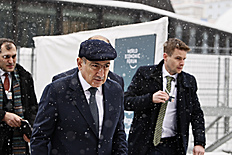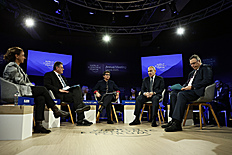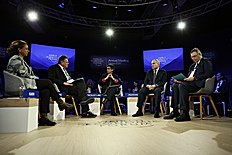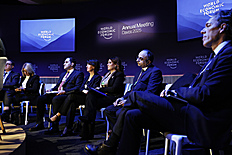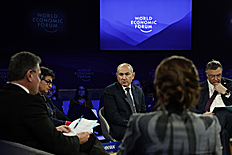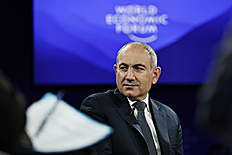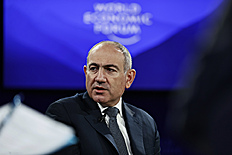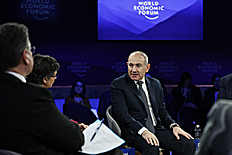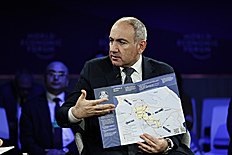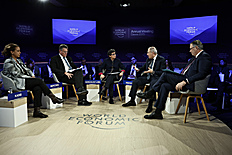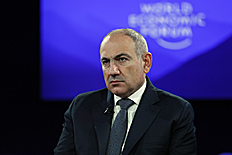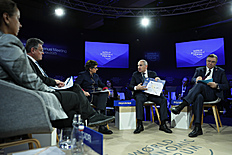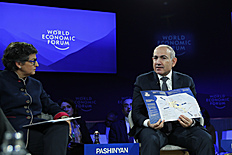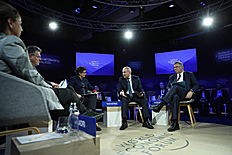Press releases
We have decided to adopt a balanced and balancing foreign policy, which means that we will try to balance relations with the EU, Russia and regional powers. Prime Minister
more 11 photos
Prime Minister Nikol Pashinyan participated in a panel discussion on “How to Project Europe’s Power” within the framework of the World Economic Forum in Davos.
Nikol Pashinyan answered the moderator’s questions, we present the Q&A in full:
Question - Let me now move to the Prime Minister of the Republic of Armenia. Of course, Europe is more than the European Union, is wider, is made of countries that want to become member of the European Union, like is the case of Armenia, is also made of other countries that don’t want to join the European Union, like Switzerland or Norway, but still want closer ties with the European Union. You have recently tabled a bill to initiate the accession negotiations with the European Union. Tell us a little bit what this discussion means for a country like Armenia.
Prime Minister Nikol Pashinyan - Thank you very much. In reality the initiative was by the civil society and they presented the draft law on starting the process of accession of Armenia to the European Union and our Government endorsed that, and there is a very high probability that our parliament will adopt that law, which would mean that we legally start the process of getting more and more closer to that European Union.
Why do we want to be closer to the European Union? Because we are democracy. When you are democracy you want to be closer or in mainstream of democracy, because otherwise would be illogical. Now we work very closely with the European Union and to be honest during the last years tremendous changes and improvement happened in our relations with the European Union, for example we just started the negotiation on visa liberalization agreement, which was in our agenda for long years, but we were not able to start even the negotiations. And I hope we will be able to end it and sign as soon as possible.
Now Armenia is included in the program of European Peace Facility, which is also very important, we have now the European civilian mission in our country, which is also very important. We are in the process of implementing the Comprehensive and Enhanced Partnership Agreement with the European Union. We are working very closely.
As far as economic ties are concerned, of course we want to be closer to the European Union economically as well, but on the other side we want to be economically closer with our regional countries as well, because unfortunately, from the beginning of our independence, we were in kind of economic isolation, because our borders with Turkey and Azerbaijan were and are closed.
To make change not only in our region, but also globally in terms of overcoming this supply chain shocks, we have put on the table our proposal, our project of ‘’Crossroads of Peace’’, which I hope is familiar to you. It is about making our regional transport communications more effective and to create new transport communications not only with Azerbaijan, but with Turkey as well, to deepen our cooperation with Georgia, with Iran, but it is also about the European Union, because when this project is implemented, we will have new chain routes through Armenia to European Union.
You know it is not just a matter of economy, it is also a very important security factor, because you just mentioned interdependence as a very important factor for overall stability and security. But off course this project will work only in case, or when we manage to create sustainable peace with Azerbaijan, which unfortunately is not the case now. We are working in that direction. Now we need to establish diplomatic relations with Turkey and we are working on this topic as well. Usually people ask whether I am optimistic or pessimistic on this matter. I must say I am neither optimistic, nor pessimistic, I am pragmatic, I just understand that we need to work until the task is solved. The main and I think most important thing is not to be derailed from the peace agenda, to concentrate on the goal and to continue working without giving up, without being frustrated. But for this of course we need to have the support of the international community and I hope this support will be delivered.
Question - Thank you Mr. Prime Minister. You reminded me of what my former boss in the European Commission Jacques Delors used to say, “You don’t have to choose between being an optimist or a pessimist, you have to choose to be an activist”.
The moment we live in is a geopolitical one where every player wants others to take sides. And you will be one of those whom everyone will say you have to be with me, and if you are not with me, you are against me. There is the US, there is obviously China, in your neighborhood there are players too, there is Russia, there is the Gulf countries, there is Europe. So how will you navigate this?
Prime Minister Nikol Pashinyan - You know that’s why we decided to adopt balanced and balancing foreign policy, which means that we will try to create balance between our different relations with the European Union, with Russia, with our regional powers.
Our relations with Iran are very important, and I mentioned already we are trying to establish diplomatic relations with Turkey, we are trying to reach a peace deal with Azerbaijan. Of course, it is not easy, but from the other side I don’t think it is impossible. Because it could seem kind of strange, but we are suspiciously transparent with all our international partners, we are sharing with all our partners what we are doing with other partners.
You mentioned our decision to get closer with the European Union, but we are trying very intensively to share our position with Iran, we are trying to share very actively our position in Russia, and with all our partners. Because, you know, after all, Armenia is an independent country, and of course there are very many challenges and threats in this challenging time, but from the other side it is a huge time of changes. Definitely and obviously the times of changes bring huge threats, but from the other side also huge opportunities. We are trying to manage threats and to use opportunities.
I think this is the only pragmatic way to go forward, but without forgetting about balances, because losing the balance could lead to very heavy consequences for security and stability, not only in terms of a country, but in terms of a region and in terms of global stability, because any instability in any region could start a process of chain process worldwide, even in small countries and regions. That’s why I think to be balanced and not forgetting about the task of balancing is the most important thing.
